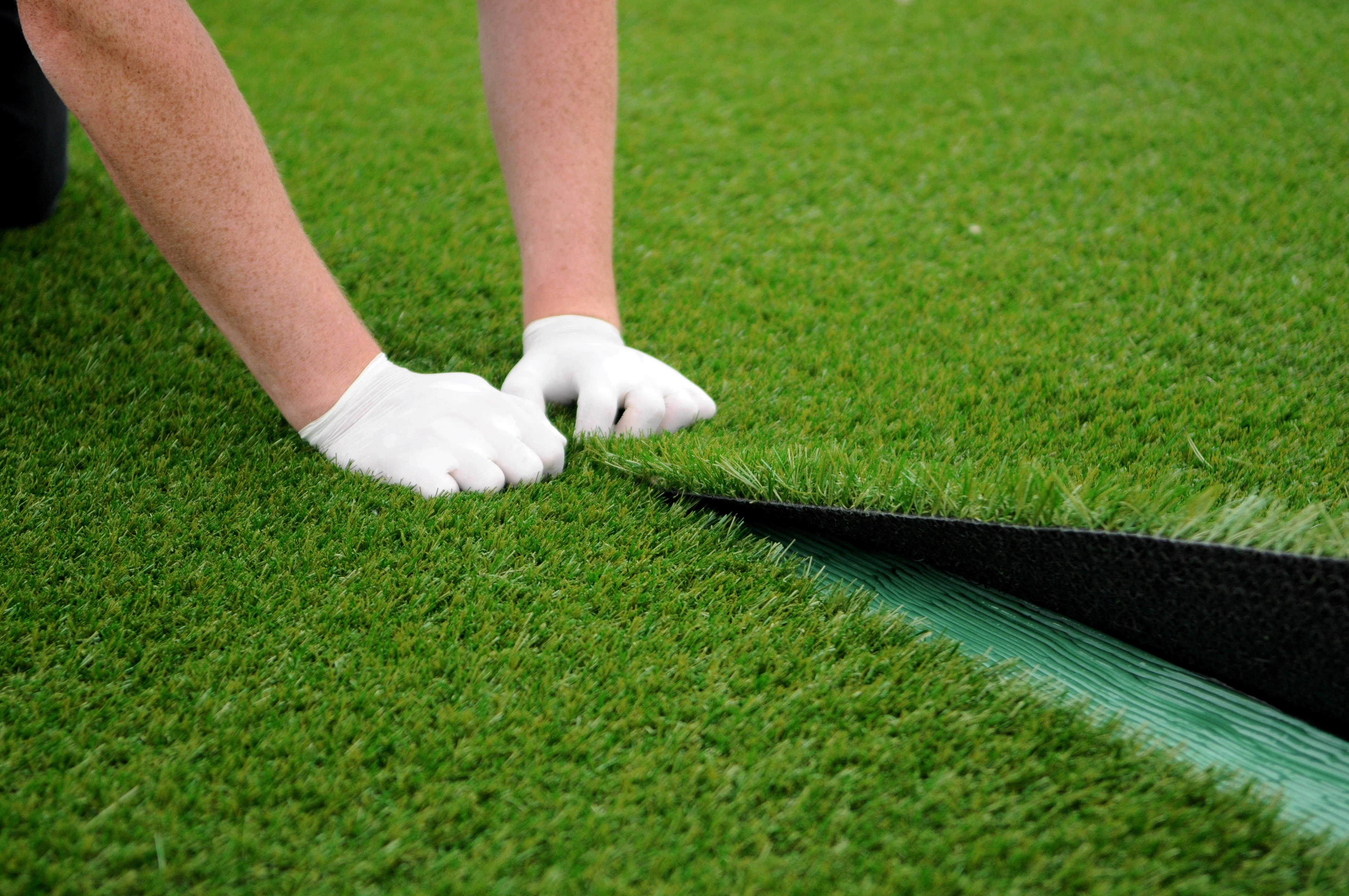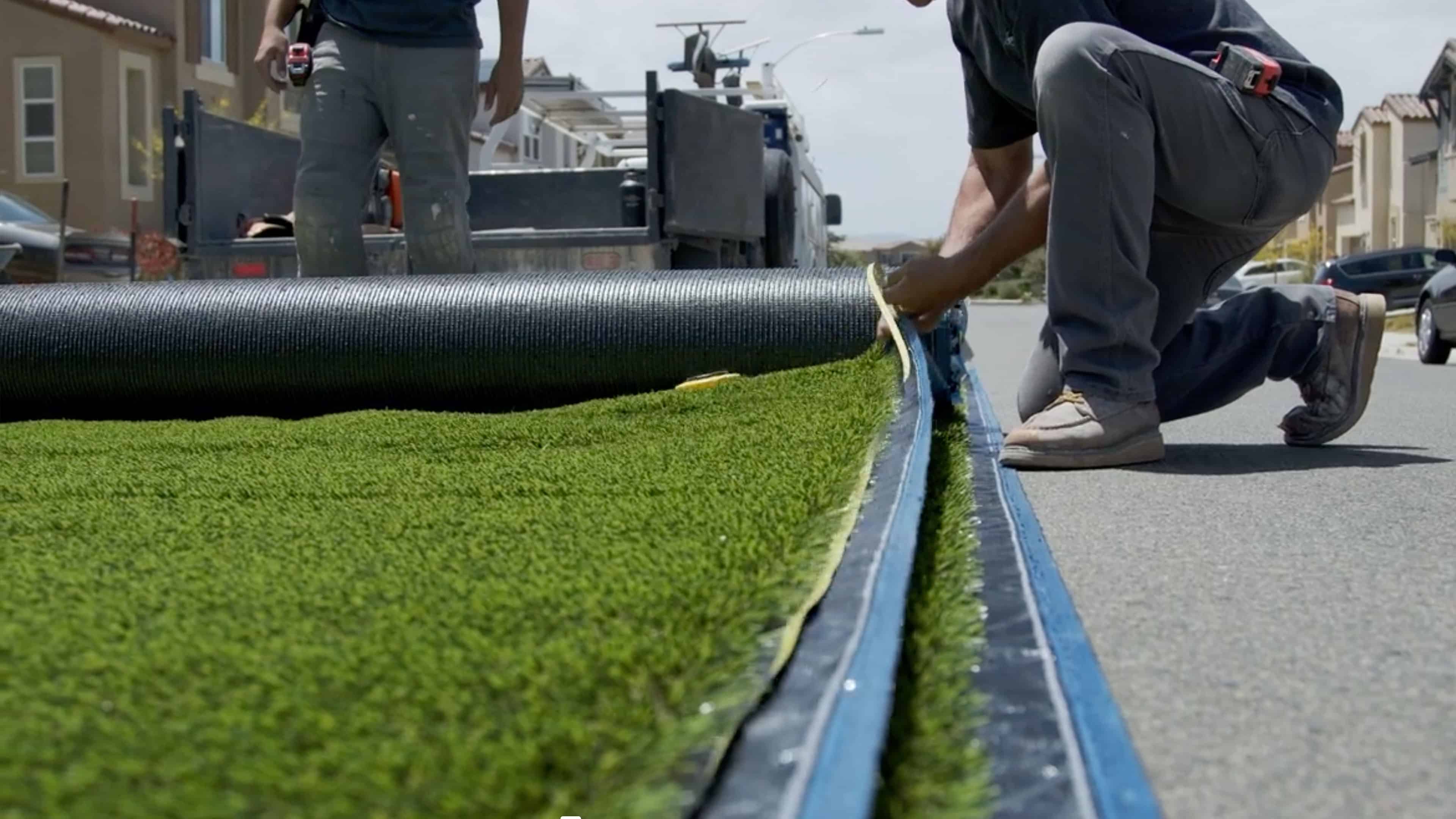Discover the Advantages of Choosing Artificial Turf for Your Landscape Transformation
The selection to integrate artificial lawn into your landscape design presents a myriad of benefits that extend past mere appearances. This cutting-edge remedy not just reduces upkeep initiatives yet likewise promotes environmental sustainability through decreased water consumption and chemical use. Furthermore, its convenience makes it suitable for various applications, from property yards to industrial rooms. As we check out the multifaceted advantages of artificial grass, you may locate on your own reassessing standard landscape design methods and the long-term ramifications they bring for both your spending plan and the atmosphere. What opportunities await your exterior change?
Low Upkeep Needs
Among the main benefits of man-made turf is its extremely reduced upkeep needs (artificial grass). Unlike all-natural lawn, which demands normal mowing, watering, and feeding, artificial grass supplies a convenient option. House owners and business residential property supervisors can save significant time and sources, as the need for regular yard care tasks is substantially diminished
Man-made grass gets rid of the need for pricey water supply, reducing water costs and preserving this essential source. In addition, it does not need chemicals or plant foods, which not only reduces maintenance efforts but additionally promotes a much safer setting for kids and family pets. The absence of mud and grass cuttings implies that clean-up is uncomplicated and fast, enabling for more time to take pleasure in the exterior area.
One more remarkable element is the longevity of man-made yard. Produced to endure heavy foot web traffic and numerous weather condition problems, it retains its visual allure over time without the typical deterioration related to natural grass. Subsequently, homeowner can take pleasure in a consistently lavish and eco-friendly landscape year-round, additional emphasizing the usefulness of synthetic grass in today's fast-paced way of life.
Ecological Benefits
Lots of homeowners and companies are significantly acknowledging the environmental advantages of man-made yard. In contrast, fabricated yard needs no watering, contributing to water conservation initiatives and minimizing tension on local water materials.
In addition, fabricated turf eliminates the need for chemical plant foods and chemicals that are often made use of on all-natural grass. These chemicals can leach right into groundwater and add to contamination, adversely affecting regional ecological communities. By picking synthetic lawn, homeowner can produce a safer atmosphere for family pets, wildlife, and youngsters.
Furthermore, artificial grass dramatically decreases carbon emissions related to lawn upkeep. Conventional landscape design commonly requires gas-powered devices for cutting and maintenance, adding to air contamination. In contrast, synthetic lawns need minimal maintenance, causing lower carbon footprints.
Eventually, the adoption of fabricated turf offers a possibility to improve green spaces while promoting sustainability. By deciding for synthetic grass, individuals and organizations can play an important duty in saving sources and shielding the setting for future generations.
Cost-Effectiveness With Time
Cost-effectiveness is an engaging reason for organizations and house owners to think about man-made yard as a long-term investment - artificial grass installation. While the preliminary setup expense might be greater than all-natural yard, the advantages with time considerably surpass this upfront expense
Man-made turf removes the requirement for regular maintenance jobs such as mowing, watering, and feeding. This not only saves labor prices but additionally lowers water bills, making it an ecologically pleasant selection that adds to lower utility expenses. In addition, the longevity of synthetic grass indicates it can hold up against heavy foot traffic and negative climate condition without wearing away, leading to fewer replacement costs throughout the years.
Furthermore, man-made grass does not require herbicides or chemicals, bring about cost savings on chemicals and contributing to a much healthier environment. Homeowners and companies best site can likewise take advantage of a regular, lush appearance throughout the year, lessening the potential requirement for expensive repair services or re-sodding as a result of natural damage.
Aesthetic Allure

Furthermore, the color alternatives and appearances available in man-made grass items permit personalization to fit different design choices. Property owners can select from a variety of tones and blade lengths, ensuring that their landscape matches existing design and individual design. In addition, the harmony of fabricated yard adds to a polished, manicured look that is often difficult to achieve with natural grass.
The low upkeep needs of synthetic turf further assistance its visual advantages, as home owners can spend much less time mowing and even more time appreciating their outside rooms. On my explanation the whole, the visual charm of artificial grass not just enhances residential property worth but also develops a welcoming setting that motivates exterior tasks and relaxation throughout the year.
Versatile Applications
Synthetic grass provides a remarkable level of flexibility, making it suitable for a large range of applications beyond conventional lawns. Its sturdiness and reduced upkeep requirements make it an optimal choice for numerous settings, including residential yards, business buildings, and public parks.
In property spaces, artificial turf can boost outdoor living locations, transforming patio areas and decks into lively green environments excellent for entertaining or relaxation. It is also a preferred selection for backyard, offering a secure, supported surface for youngsters while getting rid of mud and lawn discolorations.
Readily, companies utilize fabricated yard to boost their curb appeal, specifically in high-traffic areas where all-natural grass might struggle to thrive. Its application encompasses golf training courses, sports areas, and also pet centers, where a regular, well-kept surface is necessary for capability and looks.
Additionally, fabricated lawn finds utility in city landscapes, rooftop yards, and vertical installations, permitting for environmentally friendly environment-friendly areas in restricted areas. This versatility not only adds to aesthetic enhancement yet likewise promotes sustainability, making artificial yard an important possession throughout varied applications.
Conclusion

One of the main benefits of artificial lawn is its remarkably low upkeep requirements - artificial grass installation.Synthetic yard eliminates the requirement for costly sprinkling systems, decreasing water expenses and saving this crucial source. In comparison, artificial lawn requires no watering, adding to water basics conservation initiatives and minimizing stress and anxiety on local water supplies
Unlike all-natural lawn, which can experience from seasonal adjustments, dry spells, and use and tear, man-made yard keeps its lavish appearance no matter of ecological problems. Additionally, the harmony of man-made yard adds to a brightened, polished look that is often hard to achieve with natural grass.